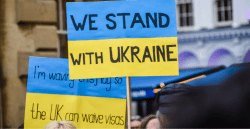This article shows how one church responded to a young trafficking victim and reminds readers that a slave can be a man coerced into forced labor in India…or a teenage girl sitting in the back pew of your own church…
It is normal for everyone to want to be loved. Anna was a teen when she met an older man who showed her the attention she needed. Soon she thought she was in love. Then her new boyfriend, who had other plans for their relationship, talked Anna into being part of his special art project. Soon she was part of the dark world of pornography.
This month is National Slavery and Human Trafficking Prevention month. An organization, Walk Free, is committed to bringing an end to slavery and they estimate that 36 million people are modern day slaves.
During an interview for this article, Anna shared her story. When she was asked how the local church served her during her exploitation,” she gave a surprising response. “For years, I went to church regularly. No one noticed anything. Everyone thought I was happy, so nothing wrong could be going on.”
Amanda Eckhardt is the director of Restore NYC and works with hundreds of victims a year. She says that some traffickers allow their victims to attend church regularly. This article explores how church congregations deal with “caring for the least of these” (a reference from the book of Matthew).
Churches are one of the few places where victims can be safely away from their perpetrator, and this article gives some suggestions that may help church communities do a better job or responding. Congregations should be aware of human trafficking and its signs. They should keep the National Human Trafficking Hotline number near all of their phones. And they should get to know their members better. After all, sometimes it simply takes building a closer relationship to recognize issues that might otherwise stay hidden.
Anna didn’t receive help at her church, but she did get support at a Christian care facility for young women.
To read the entire article, click on the link below.







Freedom United is interested in hearing from our community and welcomes relevant, informed comments, advice, and insights that advance the conversation around our campaigns and advocacy. We value inclusivity and respect within our community. To be approved, your comments should be civil.